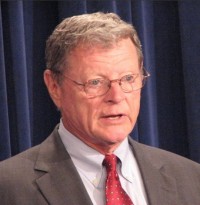Senator James Inhofe, EPW
Sen. James Inhofe (R-Okla.), Ranking Member of the Environment and Public Works Committee, criticized the Democrats Consumer First Energy Act as a “No” Energy bill in floor remarks today. Senator Inhofe voted against cloture on the bill today.

“Here we go again. As the price of gas at the pump continues to go up, Democrats are proposing yet another energy tax,” Senator Inhofe said. “The Democrats don’t appear to have learned anything from their stunning defeat of their climate tax bill last week, which over 20% of Democratic Senators could not even support. This week their attempted ‘solution’ to our energy challenges is to raise taxes again and further harm American families.
The Democrats have introduced an energy bill which contains no energy. The Democrats’ bill does nothing to increase access to America’s extensive oil and natural gas reserves, does nothing for the promotion of nuclear energy, does nothing to increase refinery capacity, does nothing for electricity generation or transmission, and does nothing for the utilization of clean coal.
The simple fact remains that until we explore and develop domestic energy resources and increase domestic refining capacity, the cost of gas at the pump will increase. Now is not the time for politics as usual - now is the time for common sense solutions. The Democrats’ bill increases taxes by $17 billion on America’s oil and gas producers and increases government bureaucracy.”
See also these FACT CHECKS on Senator Boxer’s Tax Claims.

EPW Senators Baucus, Warner, Boxer, and Lieberman
Wall Street Journal Review and Outlook
For months, Democrats and the environmental lobby promoted last week’s Senate global-warming debate as a political watershed. It was going to be the historic turning point in U.S. climate change policy. In the event, their bill collapsed in a little more than three days. Democrats failed to secure a majority, much less the 60 Senators necessary, for a procedural vote on Friday morning that would have allowed the real work of amending the bill to begin. By that point, Majority Leader Harry Reid had already made it plain that he wanted the bill off the floor as quickly as possible - despite calling climate change “the most critical issue of our time.” But not critical enough, apparently, even to let his Members vote on the merits, much less amendments.
The strange death of this year’s cap-and-trade movement was so unexpected that some are already predicting a shift in the politics of global warming. That’s premature. Still, the postmortem holds lessons for the next time this issue emerges. Until last week, the Democratic M.O. on climate change was to lash the Bush Administration for its supposed inaction and then pass responsibility onto regulators and the courts. Proponents thought they had the whip hand. Yet this time they had to defend an actual piece of legislation – and once it was subjected to even preliminary scrutiny, the Democrats crumpled faster than you can say $4 gas.
Bad timing was the least of it. Republicans methodically dismantled the cost and complexity of “cap and trade,” which sounds harmless but would inflict collateral damage on the wider economy in lost GDP and higher prices up and down the energy chain. Conveniently, the Democrats would also bestow unto Congress (read: themselves) some $6.7 trillion in new tax revenues and carbon welfare handouts over the next four decades. Their task was helped along by the incompetence of the Democrats, especially floor manager Barbara Boxer. Environmentalists deemed it blasphemy that anyone would oppose their grand ambitions, instead of trying to persuade. . “I resent the Senator from Tennessee saying our bill is a slush fund,” Ms. Boxer said at one point, apparently serious.

Senators Baucus, Warner, Boxer, and Lieberman
Even Barack Obama and John McCain backed away from a bill they claim to favor. Mr. McCain said he opposed it because it didn’t do enough for nuclear power, while Mr. Obama blamed the failure on Republicans. But the word on Capitol Hill is that both Presidential candidates urged Mr. Reid to yank the bill, lest they get trapped into voting for higher energy prices. Read more here.
Lawrence Solomon, Financial Post
Planet Earth is on a roll! GPP is way up. NPP is way up. To the surprise of those who have been bearish on the planet, the data shows global production has been steadily climbing to record levels, ones not seen since these measurements began.
GPP is Gross Primary Production, a measure of the daily output of the global biosphere --the amount of new plant matter on land. NPP is Net Primary Production, an annual tally of the globe’s production. Biomass is booming. The planet is the greenest it’s been in decades, perhaps in centuries. The results surprised Steven Running of the University of Montana and Ramakrishna Nemani of NASA, scientists involved in analyzing the NASA data. They found that over a period of almost two decades, the Earth as a whole became more bountiful by a whopping 6.2%. About 25% of the Earth’s vegetated landmass—almost 110 million square kilometres—enjoyed significant increases and only 7% showed significant declines. When the satellite data zooms in, it finds that each square metre of land, on average, now produces almost 500 grams of greenery per year. Why the increase? Their 2004 study, and other more recent ones, point to the warming of the planet and the presence of CO2, a gas indispensable to plant life.
Until the 1980s, ecologists had no way to systematically track growth in plant matter in every corner of the Earth—the best they could do was analyze small plots of one-tenth of a hectare or less. The notion of continuously tracking global production to discover the true state of the globe’s biota was not even considered. Then, in the 1980s, ecologists realized that satellites could track production, and enlisted NASA to collect the data. For the first time, ecologists did not need to rely on rough estimates or anecdotal evidence of the health of the ecology: They could objectively measure the land’s output and soon did—on a daily basis and down to the last kilometre.
As summarized in a report last month, released along with a petition signed by 32,000 U. S. scientists who vouched for the benefits of CO2: “Higher CO2 enables plants to grow faster and larger and to live in drier climates. Plants provide food for animals, which are thereby also enhanced. The extent and diversity of plant and animal life have both increased substantially during the past half-century.” Read more here.


